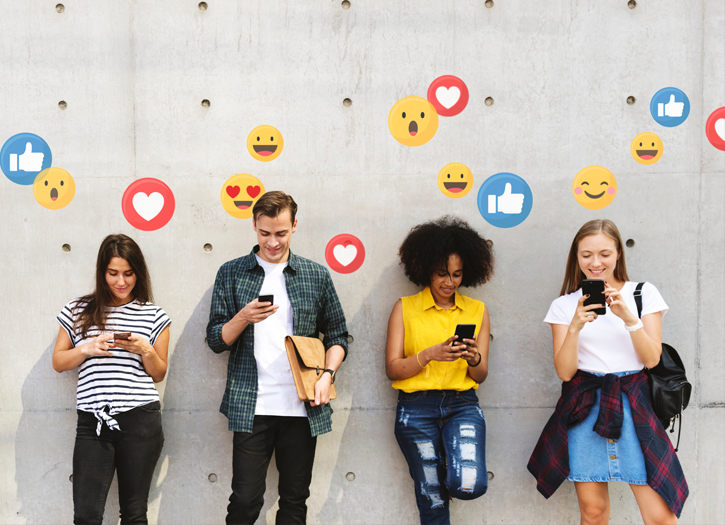The 2019–20 coronavirus pandemic has affected the usage of social media by the world’s general population, celebrities, world leaders, and professionals. Social networking services have been used to spread information, and to find humour and distraction from the pandemic via Internet memes.
Social media has seen a sharp increase in use during the pandemic, largely due to social distancing measures encouraged by many governments. Since many people are asked to remain home, they have turned to social media to maintain their relationships and to access entertainment to pass the time. . Therefore, many online counseling services that use social media have surfaced and begun to rise in popularity, connecting mental health workers with those who need them.
Since many people cannot connect with their friends and family in person for the time being, social media has become the main form of communication to maintain these valuable connections. For example, Facebook’s analytics department reported over 50 per cent increase in overall messaging during the last month of March 2020. WhatsApp has also reported a 40 per cent increase in usage. Moreover, the video conferencing platform Zoom has seen an enormous user increase since the start of the pandemic. Facebook, Twitter, and YouTube have all increased reliance on spam filters because staff members who moderate content were unable to work.
Particularly in countries where the virus was hit hardest, such as China, online mental health services received a surge in demand. This is because COVID-19 has forced many difficult and unplanned lifestyle changes, which are never easy to adjust to. In China, medical staff has used social media programs like WeChat, Weibo, and TikTok to roll out online mental health education programmes. In Canada, the provincial government of Alberta has launched a $53 million COVID-19 mental health response plan, which includes increasing accessibility to phone and online supports with existing helplines. In the province of Ontario, the government has provided emergency funding of up to $12 million to expand online and virtual mental health supports.
Many Internet memes have been created about the pandemic. A Facebook group has even been created as a space for young people (predominantly Generation Z) to share memes they create and find about the pandemic. The group is called “Zoom Memes for Self Quaranteens,” playing on pun of the increase in Zoom usage and self-quarantining as teenagers, and has over 500,000 members as of April 2020. The group serves as entertainment for the hundreds of thousands of young people that have been forced to switch to online school, helping them pass the extra time and help cope with the situation.
Social media has been used by news outlets, organizations, and the general public to spread both valid information and misinformation about the pandemic. The CDC, WHO, medical journals, and health care organisations have been updating and spreading information across numerous platforms with partnerships with Facebook, Google Scholar and Twitter. Others such as an attending emergency medicine physician in the New York hospital system have been using their social media accounts to report first hand accounts of working to combat COVID-19. It was reported on 8 April, that COVID-19 conversations around disease states have increased 1,000% around healthcare professionals and 2,500% among consumers based on a social listening study from 1 January to 19 March.
During the pandemic many celebrities took to social media to interact with their fan bases and attempt to alleviate the situation through posts, acts of kindness or trends. Some have had posts swiftly condemned by the public, such as Gwyneth Paltrow who deleted a tone-deaf Instagram post about her designer fashion and Jared Leto who caused anger with his Twitter post about coming out of a 12-day silent meditation isolation in the desert. Other celebrities or their family members used social media to announce their positive diagnosis of the disease such as Tom Hanks and Rita Wilson, Idris Elba, and Daniel Dae Kim. An Instagram post made by K-Pop Star Kim Jaejoong claiming that he had contracted the disease and was in the hospital receiving treatment, was later deleted and framed as an April Fools’ Day prank to raise awareness of the pandemic.







Add Comment